COAST SALISH TERRITORY – In May 2011, BC First Nations leadership came together to make the largest self-determining decision ever made in the province: to take control over their own health and wellness. The First Nations Health Authority (FNHA), a first of its kind in Canada, was created by and for First Nations people and is working to change 'the system' from sickness to wellness. FNHA champions a holistic perspective that includes physical, mental, emotional and spiritual health and wellness. These are intrinsically linked to connections to family, community, culture and land.
Providence Health Care is one of the largest Catholic health care organizations in Canada serving more than 600,000 patients per year. It operates 17 sites in Vancouver and provides health care to many BC residents, including First Nations people. As well, it is a training and research hub. Providence Health Care's oldest founding congregation were the Sisters of Providence, who founded St. Paul's hospital in 1894.
FNHA, Providence Health Care and the Roman Catholic Archdiocese of Vancouver came together in ceremony to mark the start of a new partnership on September 26, 2017. The FNHA leads with ceremony and we worked with our Elder, Leonard George, Qut-Same, (Səl̓ilwətaɁɬ Nation), for guidance on the process and protocols of the ceremony.
Painful history between the Catholic Church and First Nations people meant that truth, sharing, acknowledgement, and ceremony were critical first steps.
"We've endured a lot with colonization. We've been through a lot. Some of the worst neglects and abuses that we've suffered have come though institutions. And so today this work is what our Elders would describe as 'untying' some of that harm…to heal, to make better. And so that's what your presence here today is," explained Gabriel George (Səl̓ilwətaɁɬ Nation), who led the ceremony. Gabriel represented his family, the Tak'aya Wolf Clan, into which all FNHA staff have been adopted.
"As a First Nations organization – built by First Nations, for First Nations – we could not begin a partnership with a faith-based organization without leading with ceremony," said Joe Gallagher (Tla'amin ancestry), FNHA CEO.
Untying and healing through ceremony
Over 45 attendees gathered in the Chief Simon Baker Room at Vancouver Aboriginal Friendship Centre. Syexwaliya, an Elder from Skwxwú7mesh Úxwumixw shared a welcome and opening prayer.
"We welcome you. We are grateful and thankful to you. And we welcome you to the traditional territories of the Coast Salish Nations of Skwxwú7mesh (Squamish), Səl̓ilwətaɁɬ (Tsleil-Waututh) and xʷməθkʷəy̓əm (Musqueam) Nations. I pray for all of us that with this work that we do today, we come together with one heart and one mind," said Syexwaliya.
Four witnesses were called. Each received quarters from FNHA family members in recognition of their role to remember and share the work of the day. Gabriel explained that as both the giver and receiver touch the coins, their DNA comes together as one. Later, in their role of witness, each reflected back what they had seen.
Representatives of each organization stood and were covered in a blanket and head wrap. Blanketing symbolizes being wrapped in love, giving protection, and recognition of work being done. Covering the head and ears symbolizes keeping the mind focused on the work, and listening carefully to the words that are spoken so that they can be shared with others.
Gabriel explained, "It was the wishes of our family to cover the ones that you see standing here, recognizing them for their leadership in their respective organizations and also to bring them together in one heart and in one mind. To strengthen them in their work, to strengthen them in their resolve to help our people and make things better for our people. Also recognizing our dear brother here standing in for the Archbishop. We also wanted to cover the Archbishop for the Vancouver Archdiocese and recognize the efforts that have been made."
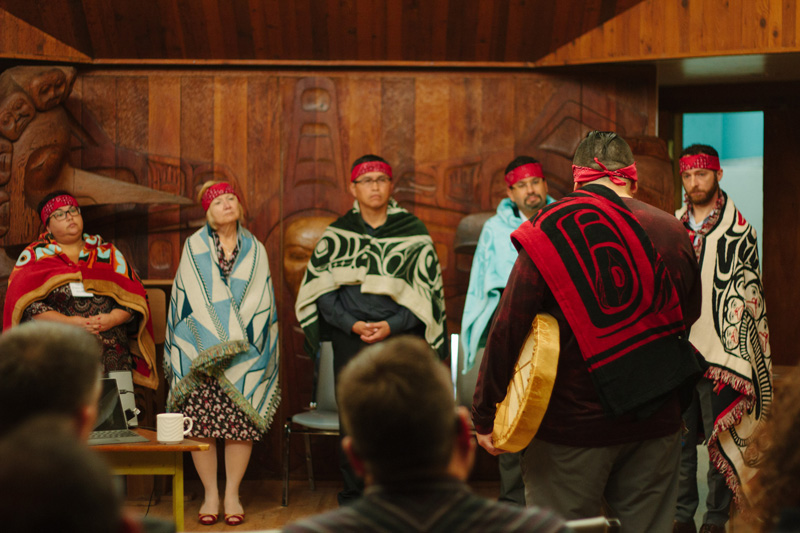
L to R: Sonia Isaac-Mann, Dianne Doyle, Joe Gallagher, Christopher De Bono, Gabriel George, Pavel Reid
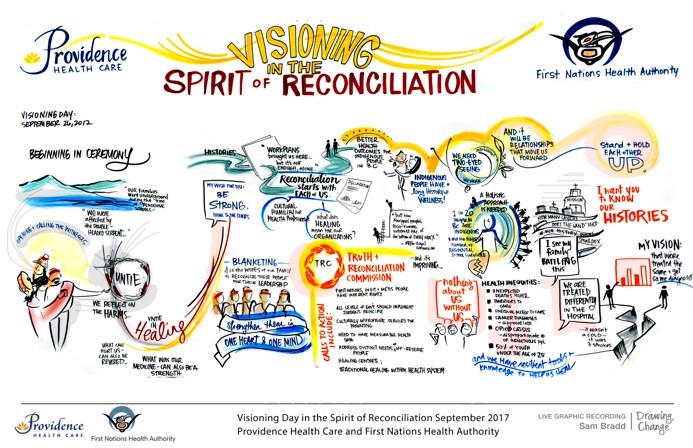
Sharing truths: Acknowledging historical harms
Throughout the full-day event many attendees shared their experiences as survivors and intergenerational survivors of the Residential School System. Others described harms they had experienced and witnessed in the health care system.
Lydia Hwitsum (Cowichan Nation), Chair of FNHA Board of Directors and one of the witnesses shared, "Me and all my siblings were born at home. My mom protected us from the healthcare system. She kept us away from doctors because she knew what they did to her ancestors. So, we were all born at home and I never saw a medical doctor until I was in my teens. My mom knew medicine. She knew roots. She knew what to do, how to gather from nature. To not keep us strong physically but to keep us strong spiritually."
She added, "I think of my brothers. I was the last of my family. My mom did everything she could to keep me out of residential school because her older children were taken out of her arms and brought to residential school."
The story of the Catholic Church and First Nations people in Vancouver has not been fully shared in our history books. Providence Health Care maintains close ties with the Roman Catholic Church of the Archdiocese of Vancouver (RCAV). The RCAV played a significant role in the Residential School System.
Five Roman Catholic-run residential schools existed within the boundaries of the Vancouver Archdiocese – St. Paul's (North Vancouver, 1899-1958), Roman Catholic Coqualeetza (Chilliwack, 1924-1942), St. Mary's (Mission, 1863-1985), Sechelt (Sechelt, 1912-1975) and Anahim Lake Dormitory (Anahim Lake, 1968-1977). Hurts and harms experienced at these schools live on within First Nations people, families and communities. On September 20, 2013, the Vancouver's Archbishop made an apology during the Truth and Reconciliation Commission event in Vancouver.
To help with the emotional weight of the day, Nola (Tsimshian and Coast Salish) and George (Tsimshian and Gitxsan) Jeffrey of Tsow-Tun Le Lum ("Helping House") Substance Abuse and Trauma Treatment Centre offered cultural supports. Anyone in attendance could join them for an individual brushing off ceremony using cedar that had been gathered according to cultural protocols.
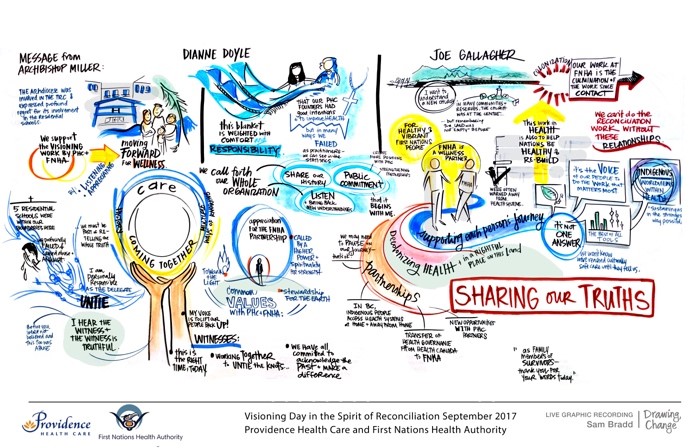
Spirit of reconciliation
Sonia Isaac-Mann (Listuguj Mi'gmaq First Nation), FNHA Vice President of Programs and Services and Christopher De Bono, Providence Health Care Vice President of Mission, Ethics, Spirituality, and Indigenous Wellness shared the 'Principles of Reconciliation' brought forward by the TRC. They emphasized the importance of respecting Indigenous self-determination, healing relationships through truth sharing and apology, and closing gaps in health.
FNHA Chief Medical Officer Evan Adams (Tla'amin First Nation) explained how First Nations people have lived on these lands for thousands of years. He shared the story of his mother's village as depicted in a sketch by one of Captain Vancouver's crew, as well as his grandfather who continued to work as a wood cutter after being blinded by smallpox. As Evan provided an overview of health disparities among First Nations in BC, he reminded the audience that the role of the FNHA is rooted in, "nothing about us without us."
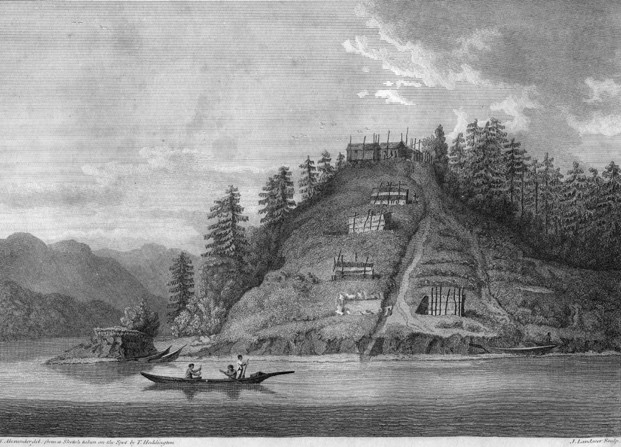
Tla'amin village, 1792
Representative of Vancouver's Archbishop Pavel Reid shared a video message from Archbishop Michael Miller. He read aloud the apology made by Archbishop Miller in 2013. For many in attendance, this was the first time they had heard the apology and it had a profound impact.
Dianne Doyle, President & CEO of Providence Health Care said, "As I wear this blanket I feel a comfort and I feel a welcoming but also as a leader…we talk about the weight of responsibility that one carries on ones' shoulders. And so, the weight of this blanket is also reminding me of that responsibility. It is with such shame and regret that as a nurse and as a leader in the healthcare system we continue to hear the stories that we've already heard, the inequities in health outcomes and access, that does not reflect our values. I make this public commitment to try and do better as a person, as a leader, and on behalf of the organization. Together, we will journey, we will improve, and I know it starts with me."
During his reflection as a witness, Mark Spelliscy, Chair of Providence Health Care Society, said, "I heard the suffering that continues today. I heard the emotional response from people say, 'yes, we can do better, we must do better, we will do better'. I heard, 'never again without us'. What I heard is that we are all committed to working toward moving forward together, to healing, to making things better than they are today…let's untie the knot."
Start of a journey towards reconciliation and partnership
On behalf of Providence Health Care, President & CEO, Dianne Doyle signed the Declaration of Commitment on Cultural Safety and Humility in Health Services with Joe Gallagher, CEO of the First Nations Health Authority.
"We are moving forward with a plan that started over 10 years ago, when all First Nations in BC came together to create a First Nations health and wellness organization, rooted in our collective values and teachings. It is about the voice of our people to make decisions over what matters to them the most. Through our governance, we are working as partners in each First Nation's person's health and wellness journey. This means bringing together the best of our world, and the best of what mainstream healthcare has to offer," said Joe.
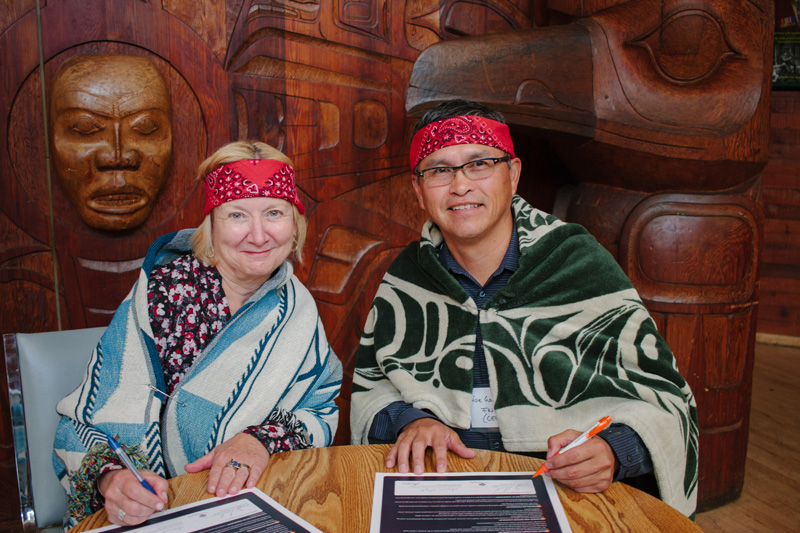
Dianne Doyle and Joe Gallagher sign the Declaration of Commitment on Cultural Safety and Humility in Health Services
By signing the Declaration, Providence Health Care joined a movement led by a landmark commitment from BC's Ministry of Health and all six health authorities in the province. Regulatory bodies of all 23 health professions in BC and BC's Coroner's Service have also signed on.
Gifts were exchanged, and then all attendees ate together. The lunch menu included traditional foods of salmon and bannock.
Looking forward
With the sharing of truths and commitments in the morning, the afternoon was focused on developing a vision for the work ahead.
• Providing input into the new St. Paul's Hospital campus being built in the coming years.
• FNHA to meet with Archdiocese.
• PHC and Archdiocese to begin/continue to engage directly with nations in the spirit of reconciliation.
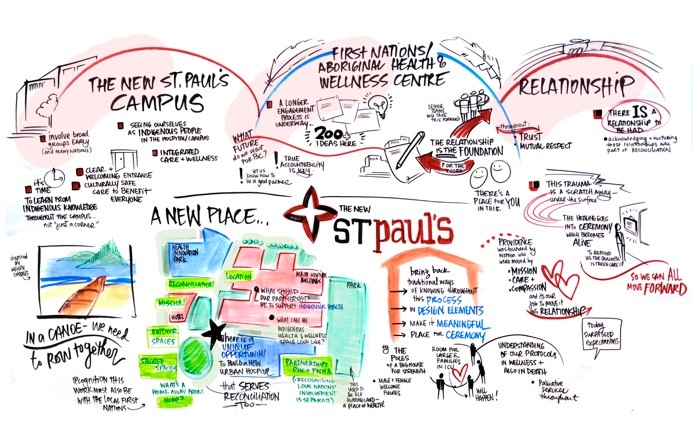
The day ended with recognition that this was just a start of an ongoing partnership journey. Syexwaliya and Deacon Rennie Nahanee (Skwxwú7mesh Úxwumixw) closed with a prayer and song.
Ceremonial guidance & teachings
Leonard George Qut-Same (Səl̓ilwətaɁɬ Nation), Tak'aya Wolf Clan, FNHA Executive Corporate Culture Advisor Elder Syexwaliya (Skwxwú7mesh Úxwumixw) Speaker Gabriel George (Səl̓ilwətaɁɬ Nation), Tak'aya Wolf Clan Witnesses Mark Spelliscy, Chair of Providence Health Care Society Neil Fowler (Mi'kmaq), Program Assistant, HIV/AIDS & Aboriginal Health, Providence Health Care Lydia Hwitsum (Cowichan Nation), Chair of FNHA Board of Directors Janelle Tom (Skwxwú7mesh Úxwumixw), Vancouver Coastal Living Markerand Senior Administrative Coordinator, FNHA CEO Office Blanketed Representatives Dianne Doyle, President & CEO, Providence Health Care Joe Gallagher (Tla'amin ancestry), CEO, FNHA Sonia Isaac-Mann (Listuguj Mi'gmaq First Nation), Vice President, Programs and Services, FNHA Christopher De Bono, Vice President, Mission, Ethics, Spirituality, and Indigenous Wellness, Providence Health Care Pavel Reid, Senior Director for Ministries & Outreach, Archdiocese of Vancouver – attending on behalf of Archbishop Michael Miller |

